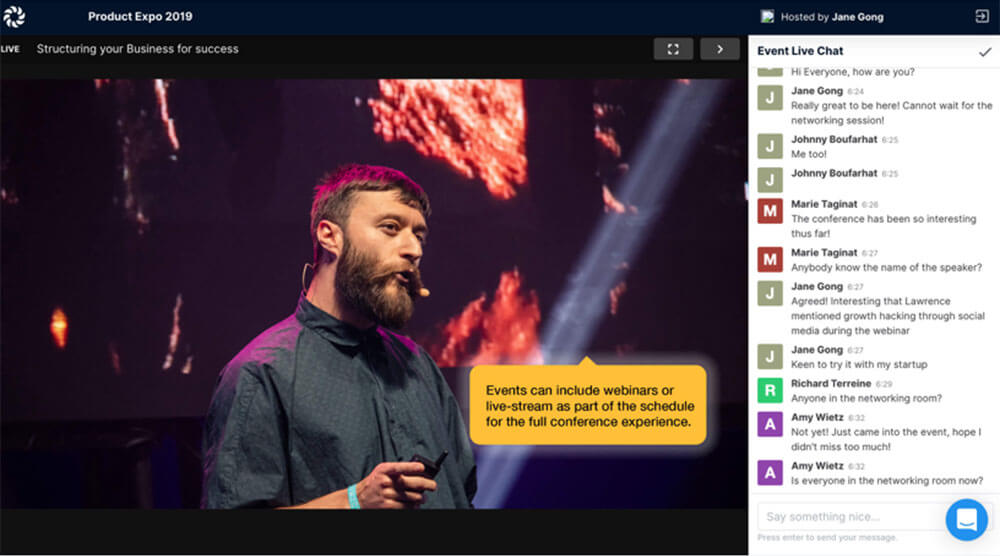
U.K.-based virtual event platform Hopin, currently in the early-access stage, is expected to be fully live by September.
Key takeaways:
- Virtual event platform startups were seeded before COVID-19, but the pandemic has resulted in a mass of postponed and canceled events around the world, “very quickly” accelerating their ramp-up.
- One U.K. startup is replicating the on-site experience with virtual booths, networking opportunities, sessions, and a stage.
Well before COVID-19 surfaced, startups were exploring ways to make the virtual event experience mirror the richness of the face-to-face environment. After all, not everyone who wants to can attend an event — like new parents or cash-strapped students — and environmental movements like “flight shaming” were spurring organizers to think more broadly about when online would be just as effective as F2F.
But with COVID-19 forcing organizers around the world to cancel or postpone events, demand is exploding for online platforms that provide livestreamed keynotes, videoconferencing for sessions, and ways to enable one-on-one networking.
Startups competing in the space, including U.K.-based Hopin and U.S.-based Run the World, are attracting the interest of event planners, the media, and venture capitalists. Hopin has raised $6.5 million from investors including Amaranthine, Accel, Northzone, and Seedcamp.And Run The World raised $4.3 million from a group including Andreessen Horowitz.
“Demand is exploding,” Accel partner Sonali De Rycker recently told the Financial Times. “The big thesis we invested in pre-corona is that [Hopin] would create a new category … a new kind of behavior.”
The behavior Hopin CEO and founder Johnny Boufarhat had in mind for the platform had to do with making business connections.
“Hopin,” Boufarhat told Convene via email, “started as a way to connect people via networking. The idea was that you couldn’t network online today … like you would at an event in person.
“The key thing for events,” he added, “is concurrency and having people have an engaging live experience. Webinars and virtual events don’t offer or haven’t offered that.”
Boufarhat’s platform, currently in the early-access stage, is expected to be fully live by September.
“We have been moving very quickly,” he said, already hosting events on the platform. Hopin has “been moving even quicker since the coronavirus,” Boufarhat added, to help conferences and events move online, instead of being canceled outright. Some events are being fast-tracked by Hopin’s team of 20 people, while more are on a waitlist.
“Never,” Boufarhat said, “did I think of something like COVID-19, but I’m happy that we can help in any way during this time.”
Hopin, which calls itself an “all-in-one live online events platform,” divides events into segments including booths, networking, sessions, and stage. The platform currently allows up to 100,000 users at once, with a goal of 1 million users by later this year.
“I am most excited about our sessions feature in Hopin because it can be used for a host of things,” Boufarhat said. “We’ve seen them used for roundtables, Q&As, panels, workshop groups, group networking, hackathons … etc.”

Diane Darling
The way the platform parallels a live event is what got former meeting planner and current event speaker Diane Darling interested. Darling discovered Hopin on AppSumo, became a micro investor, and — in the early days of the COVID-19 event disruption in the United States — touted it on the MeCo listserv as planners were searching for ways to keep their events on the 2020 calendar.
“You can’t do the Olympics in Hopin,” Darling told Convene, “but you can do a lot of things. What is really different about this compared to a Zoom or something like that is you have a main stage part of a platform and then you have breakout rooms, like you would have a breakout room at a conference. And then you can … go into a one-on-one networking.”
The platform, Darling said, “is designed to really be much more replicating of what a real live conference is like versus just a broadcast of a conference.”
Boufarhat — who told the Financial Times that he envisioned Hopin while he was at home during an illness and wanted to “figure out how to network with people and win a job” — said Hopin can recreate “90 percent of what you can do offline.”
That last 10 percent — such as bonding over beers — is still better in the real world, he told the newspaper. But with bonding over beers currently off-limits in much of the real world, the Hopin team is taking even that online.
“We’ve built a remote team with some amazing people from across the world,” Boufarhat told Convene. “Some of us have never met in person and just continue working together while using our Hopin platform to communicate and cultivate a team culture. We have our interviews on Hopin, our team meetings, game nights, parties and tea times, and it’s an awesome experience.”
Cristi Kempf is executive editor of Convene.
What Events Professionals Need to Know About COVID-19
PCMA has created a COVID-19 resources page to help event professionals find reliable information about the pandemic and to share events industry-related resources to ensure they are prepared now and in the future.
